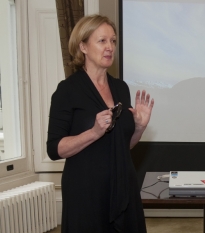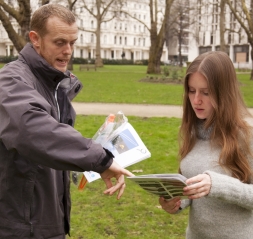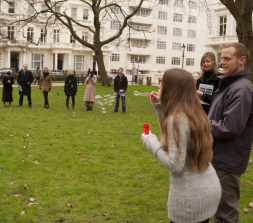Climate survey: Blow a bubble and spot a contrail

Open Air Laboratories launches national Climate Survey in Prince's Gardens - News
Thursday 3 March 2011
By Simon Levey and Sarah Baldwin
Meteorologists and other scientists are asking everyone in England to take part in a new survey exploring how we influence the climate and how the climate affects us.
See also:
Related news stories:
Open Air Laboratories (OPAL) is launching its Climate Survey today, with a reception at Imperial College London's South Kensington Campus. Led by the Met Office in collaboration with Imperial and other partners, this community science project is collecting data that will play an important role in meteorological research.
Dr Geoff Jenkins of the Royal Meteorological Society explained: "We're asking people to go outside and observe and measure the weather. What they see and record will be useful in checking the models we use for forecasting weather and predicting climate."
Participants do not need any hi-tech equipment, just to download a free survey pack from the OPAL website. They can then start looking for aeroplane contrails in the sky, watching cloud movement to record wind direction at cloud level, blowing bubbles to measure wind direction and speed at street level and noting down the clothes they wear to get a better understanding of thermal comfort.
Imperial is the lead partner of OPAL, and Dr Linda Davies (pictured right) from the College's Centre for Environmental Policy is the Director. She said: "Everyone can take part in OPAL by exploring and discovering the natural world around them. OPAL wants to inspire a new generation of nature lovers and increase environmental awareness, which has both local and global relevance."
Sarah West, OPAL Community Scientist for Yorkshire and Humber (pictured top) said: "I can't wait to take part in the survey - I love the feeling of taking part in a national science project where my results really count. I'm particularly interested in learning more about contrails and how they can affect our climate. I see them all the time but have never given them much thought, I'll definitely be looking at the skies a bit differently now!"

Dr Linda Davis (OPAL Director) at the launch event
These new insights will complement and build on existing research on the potential impacts of climate change through the twenty-first century.
Taking part in the OPAL Climate Survey
Anybody in England can take part in the OPAL Climate Survey. Here are some of the things you can do to help climate research:
Looking for plane trails in the sky
Contrails form when the temperature is cold enough (below about -40°C) but the air is humid – in a similar way to when you breathe out on a cold day and can see your breath. When fuel is burned in an aircraft's engine, the water vapour formed mixes with the very cold air and condenses, forming a trail of ice crystals. These contrails can warm the climate because they stop heat radiation leaving our atmosphere, in a similar (but smaller) way to greenhouse gases.

Taking the Climate Survey in Prince's Gardens, South Kensington Campus
The Met Office wants to have a better idea of where contrails form across England, as Dr Jenkins explained, "We know these contrails can have a warming effect on climate, but how much is currently uncertain. Getting as many reports as possible from across the country will help us make better estimates."
Mirror, mirror on the ground…
Winds are a major player in our weather systems. By reflecting the sky in a mirror placed on the ground and marked to show North, South, East and West orientation , you can track the path of clouds as they move across the sky. The line on the mirror tells us the direction the wind is blowing at cloud level.

Taking the Climate Survey in Prince's Gardens, South Kensington Campus
Riding the wind
Blow a bubble, watch where it travels to and run after it. Then blow another bubble and time how long it takes to travel 10 metres. The data collected from this experiment will help meteorologists research the effect of our local environment - such as trees and buildings - on wind speed and direction near the ground. The data will also contribute to validating computer models which forecast weather.
Feeling hot, hot, hot…
The last activity in the survey will help uncover, for example, how climate affects how hot or cold we feel and whether people in the north of England really feel more comfortable at lower temperatures than southerners. Scientists are looking for patterns across ages, gender and regions, to see if there really are any differences in people's tolerance of weather conditions. By recording your clothes, noting the temperature and indicating how warm or cold you feel, you can help them do just that.
Download your free survey pack from www.opalexplorenature.org/ClimateSurvey. Enter your results on the OPAL website, where you can see how your findings compare to others across the country.
Everywhere you go, always take the weather with you…
The OPAL Weather Roadshow will be touring the country, bringing the weather to you. Ever fancied having a go at being a weather forecaster, making a c loud in a bottle, or even your very own tornado? It’s all poss ible with the roadshow, which is coming to a town near you! Check out the touring dates on www.opalexplor enature.org/WeatherRoadshow.
Ask the expert and test your knowledge
Do you have your doubts about whether climate change even exists? Or just want to know how lightning works? No question is too big or small for our experts. Ask away at www.opalexplorenature.org/Clima teQuestions. Also you can test your knowledge with the climate game and get to grips with some real facts and figures.
Article text (excluding photos or graphics) © Imperial College London.
Photos and graphics subject to third party copyright used with permission or © Imperial College London.
Reporter
Press Office
Communications and Public Affairs
- Email: press.office@imperial.ac.uk
